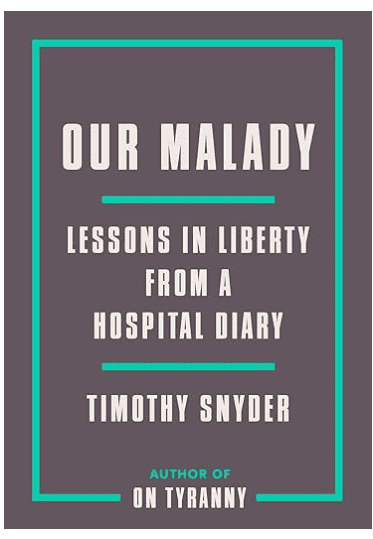By Jim Heffernan
Very often, I’ll start a book review with only a vague idea of what attracted me to the book. Not so with this book, I read an excellent op-ed piece by Timothy Snyder about the siren call of “strong men” in politics and the horrible consequences when we get them.*
I admired the writing enough that I thought he probably wrote a book I might enjoy. I chose “Our Malady” because it was a cheap kindle book. I read the sample and was hooked. The style and subject matter gripped me like a pit-bull. I read the entire book in one sitting, which is rare for me.
The book grew out of his experiences when what should have been a routine appendicitis episode became a life-threatening bout with sepsis. His medical problems provide a background for a wide-ranging exploration of the differences between “commercial medicine” as practiced in the U.S. and European medicine where it is viewed as an essential right.
A section I found particularly moving was the comparison of having their first child while employed as a professor in Austria and their experience with having their second child in the States.
This is a book I think everyone should read. No one argues that we are the richest nation on earth. Why do we have such miserable outcomes in terms of life-span and maternal mortality? Why is healthcare so often a tortuous path, open to radical changes at the whim of employer or insurance company? I think this book has the painful answers we need.
Here are some excerpts from the book.
Page 17
“The word freedom is hypocritical when spoken by the people who create the conditions that leave us sick and powerless. If our federal government and our commercial medicine make us unhealthy, they are making us unfree.”
Page 40
“Most nations’ constitutions enshrine a right to health care. The list includes Japan and Germany, whose new constitutions the United States influenced after defeating them in the Second World War. Today Germans and Japanese live longer and healthier lives than Americans.”
Page 49
“When there is no one with time to talk, no chance to find another approach, then we come to feel that we have to choose between pain and pills. […] When painkillers work, that creates a particular danger, because then we can ignore the deeper sources of suffering. […]
Suffering and self medicating are both lonely activities; they feel like free choices, but they create an imbalance that leaves us in bondage.”
Page 59
“If we have a right to pursue happiness, then we have a right to the care that allows us to do so. Without health, said Jefferson very sensibly, there is no happiness. The right to liberty implies a right to healthcare. We are not free when we are sick. And when we are in pain, or when we are anxious about illness to come, rulers seize upon our suffering, lie to us, and strip away our other freedoms.”
Page 78
“The paradox of freedom is that no one is free without help. Freedom might be solitary, but freedom requires solidarity. An adult who has learned to be free in solitude benefited from solidarity as a child. Freedom is thus a loan paid out and paid back over generations.”
As always, discussion is welcome at codger817@gmail.com and, as always, I write for the joy of spreading good ideas. Feel free to forward or re-use as you like.
181 Pages (34 pages notes) Published Sept. 8, 2020
Available Cloud and Leaf Bookstore, Manzanita and Tillamook Public Library
*Below is link to strongman article, if link doesn’t work for you, e-mail me at codger817@gmail.com and I will send you a PDF version.
https://snyder.substack.com/p/the-strongman-fantasy?r=f9j4c&utm_campaign=post&utm_medium=web&triedRedirect=true


